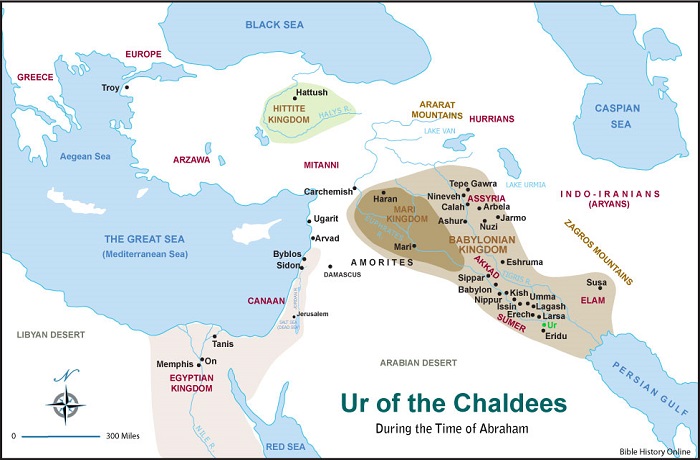In all but one reference for "Ur", a town in Mesopotamia (modern day Iraq) was stated as "Ur of the Chaldeans".
Ur of the Chaldeans was displayed to have been not far from the Persian Gulf

Links open with New International Version (NIV) verses. Unless otherwise stated, links applicable in both King James & NIV.
Verses 28 and 31 spoke of Abram's father and grandfather having come from Ur - Genesis 11:28-31:
28. While his father Terah was still alive, Haran died in Ur of the Chaldeans, in the land of his birth.
29. Abram and Nahor both married. The name of Abram's wife was Sarai, and the name of Nahor's wife was Milcah;
she was the daughter of Haran, the father of both Milcah and Iscah.
30. Now Sarai was barren; she had no children.
31. Terah took his son Abram, his grandson Lot son of Haran, and his daughter-in-law Sarai, the wife of his son Abram,
and together they set out from Ur of the Chaldeans to go to Canaan. But when they came to Haran, they settled there.
Verse 7 also referred to Ur - Genesis 15:1-7:
1. After this, the word of the LORD came to Abram in a vision: "Do not be afraid, Abram. I am your shield, your very great reward."
2. But Abram said, "O Sovereign LORD, what can you give me since I remain childless and the one who will inherit my estate is Eliezer of Damascus?"
3. And Abram said, "You have given me no children; so a servant in my household will be my heir."
4. Then the word of the LORD came to him: "This man will not be your heir, but a son coming from your own body will be your heir."
5. He took him outside and said, "Look up at the heavens and count the stars--if indeed you can count them."
Then he said to him, "So shall your offspring be."
6. Abram believed the LORD, and he credited it to him as righteousness.
7. He also said to him, "I am the LORD, who brought you out of Ur of the Chaldeans to give you this land to take possession of it."
The last mention of Ur came in Nehemiah 9:7:
7. "You are the LORD God, who chose Abram and brought him out of Ur of the Chaldeans and named him Abraham.
In an easily overlooked passage, one of David's "mighty men" was stated as "Eliphal son of Ur" in 1 Chronicles 11:35.
Neither the father or son have any other references.